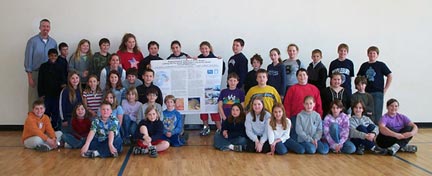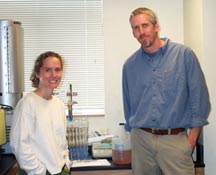| |

Summer 2004, Vol. 13, No. 5 | Return to Table of Contents
Ecosystems Center Researcher and Science Teacher Visit Siberia to Study Climate, Excite Schoolchildren About Science
 |
|
Max Holmes (top left), with Salisbury School students
displaying their research poster
|
|
Thanks to Ecosystems Center scientist Max Holmes and Vermont schoolteacher Amy Clapp, a whole new crop of scientists is budding in Salisbury, Vermont. Holmes and Clapp left for Siberia on May 21 on a dual mission: to conduct two weeks of important MBL climate-related research on the Lena River and to share their scientific adventures with Clapp’s fourth, fifth, and sixth graders and others at Vermont’s Salisbury Community School and beyond.
The collaboration is courtesy of Teachers & Researchers Exploring & Collaborating (TREC), an Arctic Research Consortium of the United States (ARCUS)-operated outreach program that pairs science teachers and cutting-edge polar researchers to bring science to life for schoolchildren. With funding from the National Science Foundation’s (NSF’s) Office of Polar Programs, TREC sends teachers on Arctic research trips and provides students with virtual scientific experiences via classroom activities, Internet-based campfire chats, on-line journals and photo albums, message boards, and live, real-time “webinars.”
|
 |
|
Amy Clapp and Max Holmes
|
Holmes, a lead investigator on The Ecosystems Center’s Pan-Arctic River Transport of Nutrients, Organic Matter, and Suspended Sediments (PARTNERS) project, discovered TREC at a scientific conference last fall. He says he recognized the value of participating in the program and submitted a proposal for a teacher to accompany him and six other American and Russian scientists on a two-week PARTNERS research trip to gather water, sediment, and other samples from the Lena River during the peak flow season on the river.
Soon TREC matched up Holmes and Clapp, and the PARTNERS project became an educational outreach vehicle. Funded by NSF’s Arctic Systems Program, PARTNERS is a comprehensive international effort among American, Russian, and Canadian scientists to study the flow of freshwater runoff from six major Arctic rivers (including the Lena) into the Arctic Ocean. The five-year project is important because if freshwater runoff from these rivers continues to increase—earlier work of Holmes and colleagues at the MBL documented an increase over the past several decades—Arctic and Atlantic Ocean salinity might decrease enough to have serious climate ramifications including a major cooling in western Europe.
Both Holmes and Clapp, who during their Siberian expedition will use a satellite phone linked to a laptop computer to communicate via e-mail with students back in the States, agree that the first-hand study of the Lena River and PARTNERS project is earning high marks from the students. “It has made it easy to get these kids excited about science,” says Holmes. “Their involvement in the PARTNERS Project gives the science they study some relevance, and therefore helps it stick. When I was young and studying science, there was nowhere for it to hang up in my mind.”
“We’re using this collaboration to teach the students the science concepts going on with this research project: convection currents, density, oceanography, and watersheds, and how satellite phones work,” says Clapp, who will be working with Holmes to gather Lena River samples aboard the vessel P406. “It’s been exciting to participate in real science research,” she adds. “I have been teaching science for over five years now and yet I have never been involved in ‘real’ science.”
From the beginning, Holmes has taken the MBL’s involvement in TREC seriously. His enthusiasm shows in the way he animates when he talks about the kids, in the numerous posts and scientific questions he has asked and answered on TREC’s community bulletin boards, and by the fact the students with whom he has interacted are viewing science in an entirely new way.
“The students love Max,” says Clapp. “He has a genuine feel for how kids work. There are many people who come into an elementary school classroom and talk over the kids’ heads and just don’t get it. What has been great is the way Max has treated [my students] like scientists and valued them for their minds. He has made the kids feel important and valued and because of that they are anxious to work with him. . . I hope that this [collaboration] will be the start of something really great in science education.”
Holmes says the MBL’s participation in the TREC program is an effective way to bring the institution’s science to an important audience. “Younger kids get so excited about this and it can really impact them,” he says. “It can help them appreciate science and I think that’s good for all citizens making decisions about science. There is also the hope that some of the kids will turn out to be great scientists.”
Note: Experience Holmes’ and Clapp’s scientific adventures by visiting the TREC Web site at www.arcus.org/TREC/.
|